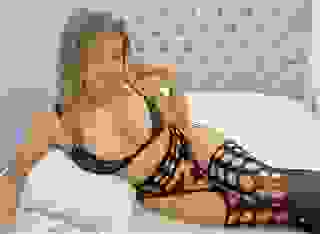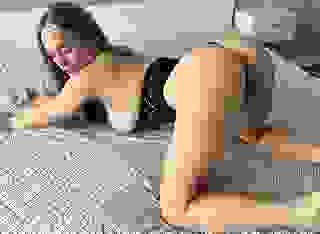- Romance
- The Magic of the White Spider
Note: You can change font size, font face, and turn on dark mode by clicking the "A" icon tab in the Story Info Box.
You can temporarily switch back to a Classic Literotica® experience during our ongoing public Beta testing. Please consider leaving feedback on issues you experience or suggest improvements.
Click hereMandy was sweating so much the back of her khaki shirt was dark brown and stuck to her skin. The back of her khaki shorts were wet from the waist down, and the center seam had crept between her ass cheeks. It was almost like seeing her ass naked. She stopped walking and turned around to face me. The front of her shirt had a brown stain on the front that spread from the buttons outward almost to the center of her breasts. The front of her shorts had the same brown stain where the legs were sewn at the crotch.
"How much longer do we have to walk in this heat? I need to stop and cool off."
Biabo, a Nanti man who had been taught English by Christian missionaries and served as the guide and interpreter for the expedition, answered her question.
"We are a day from the beginning of Rio Pequino. We will camp here tonight and go on tomorrow."
Mandy used a handkerchief to wipe the sweat from her forehead and then put the floppy hat back on over the long blonde hair she'd done up to keep it off her slender neck.
"I'm going to sit in that river and wash off this sweat, and then stay there until I feel human again."
Biabo grinned.
"No, Miss Mandy, you can't. The fishes will eat you."
"So I have to stay like this? I smell like I don't know what."
"I will have one of the men bring you a bucket of water."
Just then, there was a shout from one of the men ahead. He dropped the bundle of supplies he carried, pulled the machete from his belt and ran ahead. I heard a thunk, then another before he came walking back to the caravan. The large snake over his shoulder still writhed even though it had no head, and the man was jabbering away in Paolin. Biabo grinned.
"We will have fresh meat for our dinner."
}|{
The year was 1978 and was a year that changed my life more than I thought possible in such circumstances and in such a short time.
This had all started out with a patient I was treating as a resident in a Chicago hospital. The old man I was treating at the time was near death. He was a hundred and two according to his reckoning of the years. One day as I listened to his failing heart, he said he would confide to me a secret he'd kept nearly all his life.
"Young man, I won't live to see Mauga O Le Ola again, so I'll tell you the secret I've kept since I was twenty. You're a doctor and you'll understand the value. It's because of the natives there I've lived so long. Before my supply of their powders was exhausted, I was as strong as when I was there eighty two years ago."
I had smiled to myself. I had heard his story several times before. Like many older people, he'd lost the capacity for short-term memory and often repeated himself. Upon hearing his tale the first time, I'd spent hours at the library searching for Mauga O Le Ola in Peru, the country he had indicated as it's location. I found no reference to such a place, but his tale was intriguing enough I continued my search.
He had begun his working life as a sailor at the age of sixteen, but in 1896, he had been part of an expedition to Peru to search for the gold rumored to be there. None had been found by prior expeditions, but the leader had discovered a text written by a Spanish explorer of less renown than most. In the text, he described the location of a vast treasure in the eastern foothills of the Andes. The treasure was in a cave at the source of a small stream that flowed into the Rio Camasea and then to the Amazon River. By consulting the maps of the day, the leader had determined a probable location.
The expedition had attempted to cross the Andes from the Pacific side, for that way appeared to be much faster than trekking up the Amazon River and then through the rainforest. Their plan did not consider the difficulty of crossing the high peaks of the Andes, and the members of the expedition were near death from starvation and fatigue when they reached the eastern foothills. They were found by a tribe of natives and carried to their village.
All of the members of the expedition had succumbed to the rigors of the mountain crossing except this man. He was given a remedy of some sort by the natives, and eventually made a complete recovery. According to his tale, he left the natives with a large bag of the same remedy and followed the stream and then the river until he came to a town frequented by river craft.
He secured a passage down river by agreeing to serve as a deck hand on the boat. After several weeks, the craft docked at a seaport in Brazil. He sought and found a ship bound for Europe, and after signing on as a crewmember, made his way there. From Europe, he again crewed on a sailing ship and finally landed in Norfolk, Virginia.
He did not again go to sea, for he had had his fill of the damp, cramped sailor's quarters aboard a sailing vessel. Using his knowledge of ships and rigging, he began work in a shipyard in Norfolk. His powders kept him fit and able to work until he was in his nineties, or so he said. He required only a tiny amount of the powders each day, but at that point they were exhausted. He aged in one year so quickly he was forced to ask his niece in Chicago to care for him. When the niece passed on, his care was taken over by her daughter who put him in a nursing home. When he became ill, she brought him to my hospital.
His tale piqued my interest, but not for the promise of gold. I knew there would always be such tales and that those tales were most likely only myth. I was interested for another reason. By 1974 when I graduated from medical school, modern medicine had done much to cure and prevent disease and infection, but very little to postpone the aging process. Some of those cures had been derived from the medicines of various primitive tribes throughout the world. It was entirely possible and indeed probable that more cures and preventions were stored in the minds of the tribal healers of the Amazon rain forest.
I was not particularly interested in finding medicines to maintain the appearance of youth, though I knew finding such would certainly have been profitable. My interest was in finding a way to stave off the aging of the brain and internal organs that eventually fail and result in death. At the time of his first telling, I was twenty-eight, fresh from my internship and full of hopes for the future. I wanted to believe he might be telling the truth.
Since the man had been a sailor and was somewhat confused in his memories, I contacted the language department at the University of Illinois in Chicago and asked if they could determine the language in which Mauga O Le Ola was written. I had assumed it to be Spanish as Peru was initially conquered by Spain and excepting for tribal languages, Spanish was the language spoken. My own research indicated this was not the case. I had then tried Portuguese because Peru borders on Brazil and the language of Brazil is Portuguese. There were no such words in the Portuguese language either.
After much searching, one professor at the university identified the language. The words were Samoan, and translated to "mountain of life".
I thought the use of the Samoan language to name a place in Peru to be quite a stretch. While it had been theorized that peoples from Polynesia could have made the voyage across the Pacific, it was also generally acknowledged they would have settled on the coast since they would have been people of the sea, not of the land. They would probably not have moved inland and certainly not to the other side of the Andes. Doing so would have forced them to reinvent their entire culture. I concluded the old man was confusing two places where his ship had made port.
He told me the same story nearly every day. I listened, but by that time, had discounted it. That changed on the day before he passed away.
I was making my routine rounds and stopped by his bed. He was in bad shape by then, gasping for every breath, and he looked as pale as the sheets. I was sure he wouldn't last the night.
I listened to his heart. The regular thump was weak, and at times slowed almost to stopping and then resumed the tired sounding thud-thud. I looped the stethoscope around my neck and asked how he was feeling.
"Not good, not good at all. If only I had some of those native powders again, but I know that can't happen. You'll call my grandniece when I go, won't you? She won't come to see me, but I understand. She's young and just starting out in life. I'm just slowing her down."
I said I would, but I didn't think he needed to worry about that happening any time soon. He just smiled.
"When you get as old as I am, you'll know when it's going to happen. Oh...in the drawer over there is something for you. I don't know why I didn't remember it before. It's the pouch I carried the powders in. You take it. My grand-niece will just throw it in the trash."
I walked out of the room with the pouch. It was of some sort of leather and was so old it was beginning to crack in places. When I got back to my office, I opened it.
Inside, I could see a residue of fine, yellow powder. The old man apparently hadn't made up that part of the story. I inverted the pouch over a sterile surgical tray and tapped it. A small amount of the powder dropped onto the tray. There wasn't much, but it would be enough for Dale, one of the chemists in the hospital lab, to analyze with the mass spectrometer the hospital had just purchased.
}|{
Dale called me the next morning.
"Where in hell did you get that stuff""
"From an old leather bag an old man gave me. Why?"
"I can't figure out what the hell it is. The mass spec gives me the percentage of elements, but I can't find any known compounds that match. Did he say what was in the bag?"
I thought for a second or two. If Dale couldn't figure out what it was, maybe the old man was telling the truth about it being from some native witch doctor. If that was the case, he might have been telling the truth about it keeping him young as well. I had a quick vision of my picture on the covers of magazines and articles about how I'd discovered the cure for aging.
"No, he just gave me the bag. Can't you just make some more?"
"Tried to. I put together a set of compounds that should have matched the mass spec data when they were combined. The only problem was they wouldn't combine. I got a powder, but instead of yellow, it was a bunch of different colors just mixed together. I need some process to make the individual compounds chemically bind to each other. There's nothing in any of the chemistry texts in the lab or at my house that would do that. Would your old man know what was in the bag?"
"He might, but I don't think he'd be able to tell us. I'm surprised he lasted through the night. He probably won't last through the day. When I examined him this morning, he just laid there.
"Well, shit. I'll keep trying in my spare time, but right now, it's just foofoo dust."
"Foofoo dust?"
"Yeah, that's what we call stuff we haven't identified yet unless it's liquid. Then it's goopy goop."
He was chuckling when I hung up the phone, but I was thinking seriously, and I later realized, pretty selfishly. If I could find that tribe of natives and see how they made the stuff, I'd have made my mark on medicine, well, if it actually did anything. There would be years of testing before it could be prescribed, but if I could find out how to make it, there would at least be a supply for that testing.
I went home that night and thought some more. The old man had told me the location of the village, or at least where to start looking. The way he'd gotten there was out of the question. His expedition had proven that wasn't a good plan. The only other way was to fly to Brazil, take whatever transportation was available up the Amazon, and then go the rest of the way on foot.
I started looking at how long it might take and how much it might cost. How long was easy to figure out and was doable. I figured the travel time as about two hundred miles a day on the water and maybe five over land. That worked out to be about three weeks in, two weeks to find the village, watch the process and get a large sample, and then three weeks back out. I'd have to take a leave of absence, but that wouldn't be a problem. Other doctors did that for refresher courses and sometimes just to get away for a while.
The cost was another matter. Travel in the Amazon wasn't all that common then, so it was difficult to obtain accurate figures. I did a lot of estimating and decided I needed to find about ten thousand dollars. I was making twenty a year at the time and paying off college loans. There was no way I could do that.
}|{
The old man died about noon that day. I called his grandniece to tell her. She said she'd already made the necessary arrangements and that the funeral home would pick up the body as soon as she called them. Once that was done, she'd come over to pick up whatever he had at the hospital. I said I'd collect what there was and have it in my office for her.
At two that afternoon, there was a knock on my office door. I looked up to see a blonde woman in a blue dress standing there. She looked about thirty or thirty-five, and even though the dress wasn't anything fancy, she was very attractive. She smiled when I asked her to come in.
"I'm Mandy Monroe, Uncle Will's grand-niece. Are you Doctor Wells?"
"Yes, but call me Rick."
"I came by to pick up what my uncle left in the room."
I pointed to the paper sack on the corner of my desk.
"There wasn't much, just an old billfold, a pocket knife, and a pocket watch. The billfold only has a picture of a little girl and a union card from the Boilermaker's Union, nothing else."
She walked to my desk, opened the bag, and took out the billfold. She opened it and smiled again.
"The picture is me when I was about six. He used to tell me stories about his travels before he started to forget things. After that, he didn't talk to me much. I think he knew he was repeating things and that embarrassed him."
"He must have thought a lot of you if he carried your picture."
She sighed.
"I suppose so, and I liked him when he could remember. It was hard to be around him when Mom died and he moved in with me. That's why I put him in the nursing home. He couldn't remember anything for more than a few seconds. I couldn't bear seeing him like that all the time. That's also why I didn't come visit him here."
I tried to be comforting.
"Well, he's at peace now."
"Yes. I know it sounds selfish, but now I can be too."
"No, it's not selfish. I only see patients like him at the hospital, but I can imagine he would have occupied most of your life if he was there all the time. It's natural to feel some relief."
She reached in the bag and pulled out his watch.
"He said he carried this watch over the Andes Mountains and then all the way down the Amazon. I'm not sure I believe that, but it's one of the stories he used to tell me."
"He told me the same story, several times."
"Did he tell you about the magic powders?"
"Yes. It would be fantastic if that part was true. It might be, you know."
Mandy's look was questioning.
"You think it could be?"
I nodded.
"Well, some modern drugs aren't really modern. They're purified forms of ancient remedies from healers all over the world. Digitalis came from folk medicine practitioners in Europe, and a treatment for Hodgkin's disease was used by the healers in Madagascar. There are others - quinine, ipecac - and probably more we don't know about yet."
She sighed.
"Maybe someone will discover what his powders were one day. It's too bad he didn't have any left."
By then, I'd decided to give up any search for the village and more of the powder. I couldn't afford to do it, and I'd never be able to convince a drug company to investigate the powder unless I had enough for a thorough analysis and some preliminary testing. Even if I could find financing, the old man had gotten the powders almost eighty years before, and the village might not even be there.
"Well, actually, he did, not enough to do him any good, but there was enough to get a small sample. It was in an old leather bag he gave me. I had it analyzed, but the lab couldn't identify it. They couldn't figure out how to make any more either. A drug company probably could, but they wouldn't finance any investigation based on one old man's story. I thought about doing it, but it's pretty pricey."
"How much is pricey?"
"I sort of guessed, but I think maybe ten thousand or so."
"That is a lot. How would you do it if you had the money?"
I explained what the old man had told me about the location of the village and how I thought I'd have to get there.
She smiled.
"That would be an interesting trip even if you don't find anything."
"Probably, but it's not going to happen. It'll be years before I can afford that, and maybe never."
"Do you really think there's anything there to find?"
"I'm not sure. Your uncle was in really good shape except for his heart. I've examined people twenty years younger whose kidneys, lungs, and other organs were failing. His all seemed just fine. It could be that's just the way he was, but it isn't very common because we all age at about the same rate. I thought it was worth a shot until I figured out the cost."
Mandy seemed to be thinking. She just looked at me for almost a minute and then smiled.
"What if I gave you the money? Would you still do it?"
I had to think for a second about that. I hadn't been stretching the truth about his internal organs. There was nothing wrong with any of them except his heart. It could have been he was just at one end of the population bell curve, but then maybe...The urge to say yes was really strong.
"Probably, but even if you could, why would you do that."
She grinned.
"Oh, I could do it. My father owned a shipping company that transports things through the Great Lakes. Now that he's gone, I own it. Ten thousand isn't as much as even one cargo ship brings in. I'd just stick the profit in the bank with the rest unless I gave it to you. As for why, well, if Uncle Will was telling the truth, the rest of the world should know, don't you think? Maybe it's not a cure for aging like he thought, but maybe it's a cure for something else. Maybe that village has other things too. It would be kind of like his legacy and everybody should have some sort of legacy. Still interested?"
"Well, yes."
She grinned again.
"There's one condition. I get to come along."
My excitement cooled some then. I'd done a lot of reading when I searched for the place. The jungle was no place for a woman.
"I don't think that's a good idea. We could be in the jungle for eight weeks, maybe ten if we have any problems with transportation or finding the place. There wouldn't be any of the things you're accustomed to, and a whole lot of things you're not. Most of it would be in a boat, but we'd be walking through the jungle for at least a couple of weeks."
Mandy pulled back her shoulders and pulled her dress tight over her breasts in the process.
"I'm tougher than you think, and I like being in the outdoors. I grew up camping and fishing with Dad. I'll be fine, you'll see."
}|{
Two weeks later, and after making the arrangements with the hospital and buying some sturdy clothing and shoes, I met Mandy at O'Hare. From there, we flew to Mexico City, then on to Panama City, and finally boarded an old DC-3 for Belem, Brazil. That flight was OK from the standpoint of looking but a little boring. The Amazon jungle seemed to go on forever. All that could be seen from the air was one solid mass of trees. The flight wasn't all that great otherwise. The plane had seen better days. The seats were ripped in places, my seat belt didn't work, and when I looked out my window, I could see a piece of the engine cowling flapping in the wind.








